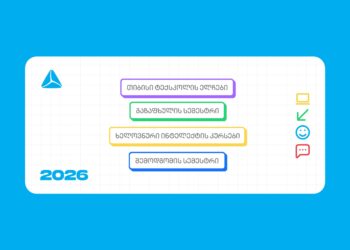Georgia Today, GT Business and The Marriott are sponsoring the Georgia & Armenia Tech/AI Hub Summit on September 21 in the Tbilisi Marriott in the Grand Ballroom, followed by a networking luncheon at the Parnas restaurant. As such, it is timely to speak about AI, especially considering we have received a myriad of questions about AI and the relevant law. This article was thus created with contributions from Anna Kravtsova, IT Lawyer from Klein & Pantsulaia and Klein & Iskandaryan based in Portugal, and Prof. Jose Romero, also of Klein & Pantsulaia.
Everyone is talking about AI these days, and while lots is certain about AI, there is as much uncertainty as well. This is especially true concerning the future of the job market, green uses, nefarious uses and legal issues.
Jobs & Threatened Industries
If you ask IT companies, most would say that AI will help their business and that it won’t lead to layoffs. Some would say that it means upscaling certain staff and leaving them to do more efficient tasks, and as such their companies will be better off and will boost their P&L. Are they in denial? Well, it’s early days, so perhaps too early to judge. An example of a potentially vulnerable IT sub-industry is software testing. Humans are employed to see if, for example, when you press “Print,” the printer does its job and does indeed print. Software testing software is available now, so maybe these jobs (and even the software testing industry itself) are under threat. Another stark example of potential job losses is large publishing houses. In June, German`s largest publisher Axel Springer laid off 20% of its newsroom; jobs where employees were compiling news sources to create content, now replaced by AI.
Our law firm realized a while back that law firms and accounting firms also have grim futures. In response, we are launching IT business consulting and AI consulting to complement our general legal practice. AI business consulting services are being done through a joint venture with a 30 person strong AI business consultancy team.
IMPROVED EFFICIENCIES; GREENING
According to Iosep Khutsishvili of Georgia`s MaxinAI (also a speaker at the aforementioned conference and AI Workshops at the Tbilisi Marriott) their company consults firms to improve efficiencies in a wide range of industries. One poignant example of this is when MaxinAI helps power plants increase efficiency (greenhouse gas reductions) and assists manufacturers to save costs; actually, to save on waste in production processes. So AI has lots of greening potential and is not all about job losses.
AI IN THE WRONG HANDS
We have all read scary stories about how cybergangsters use AI to create fake impressions of people to ask family members for money. There are numerous examples and, as time goes on, it seems unfortunately likely that new creative scams and cases of misuse will rear their ugly heads, as with any tech evolution or pioneering invention (planes were thought to be the godsend invention until we saw what happened in last centuries’ big wars).
Georgia & Armenia – an AI TECH Hub
With both Georgia and Armenia experiencing a booming tech sector due to the huge IT talent pool, there is no shortage of start-ups and young companies acting as AI IT backoffices (piggy-backing on low IT worker wages) in the Caucasus, while Western company/clients are indirectly using the local talent to create and modify these company’s AI, or assisting to improve process efficiencies.
A FEW GLARING LEGAL ISSUES
Infringement of Third-Party Intellectual Property (IP); Online News Outlets
There is an issue whereby companies or individuals using the likes of ChatGPT could be infringing on someone else’s IP. Many news outlets who make a lot of their income based upon the model that their news articles are on news.google.com are wrangling to hang on to their revenue streams since someone authoring a news article can use AI to create news content, and so the news sources won’t be compensated by google. Theoretically, it is possible to become very rich by writing such articles (without cost) and getting lots of hits that generate traffic-based ad dollars.
Who owns the AI generated IP?
That is the question of the day. That will depend on what percent of the AI was created by AI and the contribution of the person who created it. The laws are in their early days of development, and they are now and always will be different for the US, EU, Georgia etc.
There are a myriad of other IP and other legal issues and they will not be touched upon in this weeks’ column but may be discussed in future. Again, the event which will feature Special Guest DataArt will be at the Tbilisi Marriott on 21st of September. If you’re interested in finding out more, please visit www.kleinlawgroupgeorgia/events/ai.com















